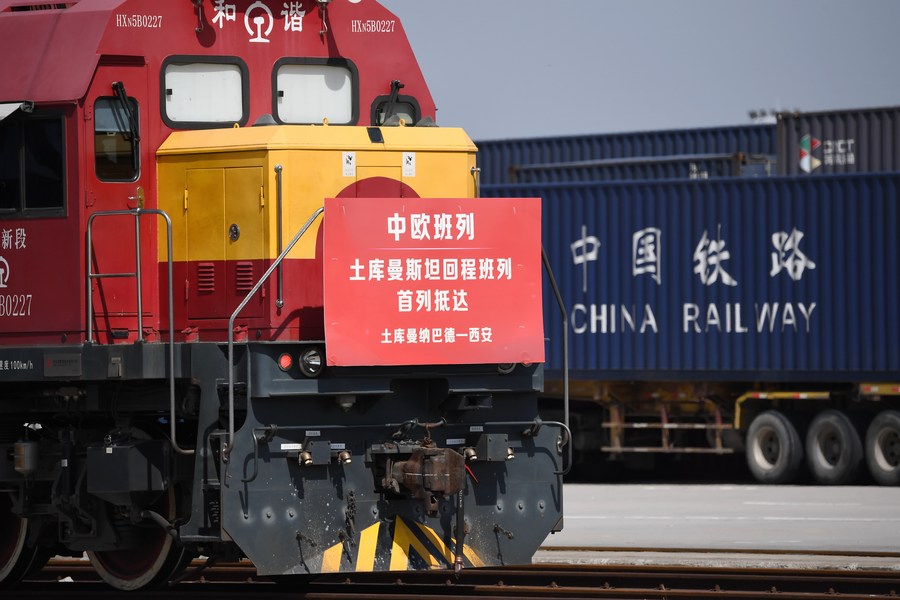
A China-Europe freight train arrives at Xi'an international port in Xi'an, northwest China's Shaanxi Province, Aug. 31, 2022. The freight train loaded with raw materials of liquorice, a Chinese medicinal herb, departed from Turkmenistan. (Xinhua/Li Yibo)
BEIJING, May 15 (Xinhua) -- The landmark China-Central Asia Summit this week is set to provide great impetus for relations and cooperation between China and the five Central Asian countries.
The summit, the first held offline by the heads of state of China and the five Central Asian countries, will take place in Xi'an, northwest China's Shaanxi Province on Thursday and Friday. The event will be chaired by Chinese President Xi Jinping and attended by the presidents of Kazakhstan, Kyrgyzstan, Tajikistan, Turkmenistan and Uzbekistan.
There already are solid foundations for expanding the all-round and win-win cooperation between China and these Central Asian countries, indicating bright prospects for jointly building a closer China-Central Asia community with a shared future.
China and Central Asian countries are comprehensive strategic partners, good neighbors, good friends, good partners and good brothers. Head of state diplomacy has upgraded and boosted China-Central Asia cooperation and deepened strategic mutual trust. In the past decade, Xi has visited Central Asia seven times. Following the principles of mutual respect, good neighborliness, friendship, mutual assistance, and win-win cooperation, China and the five Central Asian countries have set a good example of fostering a new type of international relations.
The five Central Asian countries have all signed cooperation agreements on jointly developing the Belt and Road Initiative and supported initiatives such as the Global Development Initiative and the Global Security Initiative.
Figures show fruitful economic and trade cooperation. There has been over 100-fold growth in two-way trade since China established diplomatic relations with the five Central Asian countries 31 years ago. Trade between China and the five countries reached a record 70.2 billion U.S. dollars last year. Nearly 80 percent of China-Europe freight trains pass through Central Asia. Several major projects have been completed, including the China-Central Asia natural gas pipeline, the China-Kyrgyzstan-Uzbekistan highway, and the Pengsheng Industrial Park in Uzbekistan, benefiting people in these countries.
"China's enormous market, complete industrial system and advanced technologies are very attractive to Central Asian countries, and the principle of equality and mutual benefit has enabled bilateral cooperation to achieve sustained and stable growth," said Ding Xiaoxing, director of the Institute of Eurasian Studies at China Institutes of Contemporary International Relations.
China's modernization drive will bring more opportunities for Central Asian countries. As both sides are keen to expand cooperation in agriculture, new energy, e-commerce, green and digital economy, high technology and other fields, new highlights and growth points of cooperation will be created for common development.
More than 2,100 years ago, Chinese envoy Zhang Qian was twice sent to Central Asia on missions of peace and friendship, starting the Silk Road linking the East and West, Asia and Europe. Today, people-to-people exchanges are more vibrant. There are a total of 13 Confucius Institutes in the five countries. China has also become one of the major destinations and top choices for students from Central Asia.
The upcoming summit will open a new chapter for China-Central Asia relations. It provides an important opportunity for China and Central Asian countries to make joint efforts in building a closer community with a shared future while upholding the Silk Road spirit featuring peace and cooperation, openness and inclusiveness, mutual learning and mutual benefit.
编辑:高佳槐